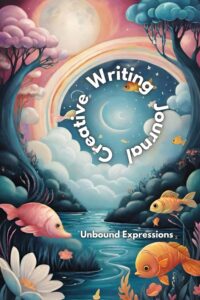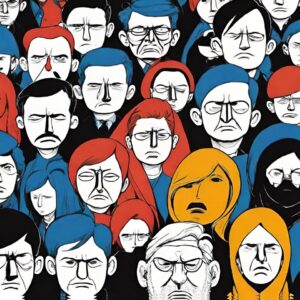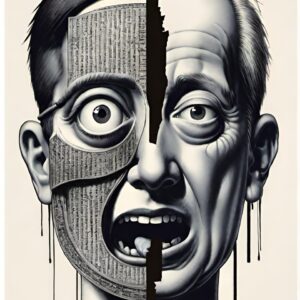In the quest for personal freedom and authentic self-expression, one of the most empowering paths to tread is finding your voice in writing. This journey not only allows you to better understand and articulate your thoughts and feelings but also opens doors to engage in and impact dialogues that shape our society.
What is Finding Your Voice in Writing?
Uncovering your voice in the realm of writing is about harnessing and sharpening your unique style and viewpoint. It’s the blending of your character, beliefs, principles, and life experiences that lends a distinct flavor to your writings. It’s not about attempting to sound erudite or cerebral, instead, it’s all about authenticity and courage in conveying your viewpoints and concepts.
Your writing voice is your literary fingerprint, it’s your exclusive way of viewing and interpreting the world around you. This doesn’t mean that you have to reinvent the wheel, but rather, it’s about being genuine and fearless in your expression. Your voice needs to be a true reflection of your individuality, and it should create a connection with your readers, drawing them into your universe of thoughts and ideas.
Intersection Between Writing and Freedom of Speech
The profound relationship between writing and freedom of speech is rooted in our fundamental God given rights. The right to freedom of speech is about being able to articulate our beliefs, opinions, and ideas openly, without the worry of censorship or repercussions. And there’s no stronger medium to assert this right than writing. Through writing, we can express our perspectives tangibly and share them with an expansive audience.
Not only does this allow for individual self-expression, but it also fosters dialogue about societal matters, and consequently shapes public sentiment and encourages social reform. By discovering and harnessing our unique writing voice, we are empowered to contribute to these discussions in a manner that is impactful, genuine, and resonant with our personal ideologies.
How to Discover Your Unique Writing Voice
Embarking on the journey to unearth your distinctive writing voice begins with a deep dive into self-awareness and introspection. Central to this journey are your passions, beliefs, and life experiences. Commence by writing about issues that ignite your passion or arouse strong emotions in you. As you write, take notice of your tone and the choice of words you use, do these elements truly mirror who you are?
Feel free to play around with diverse writing styles until you stumble upon one that feels innately you. Reading a wide range of literature can aid in this process, exposing you to an array of writing voices and styles that can help shape and enrich your own. Bear in mind that your voice is not static but dynamic, evolving and changing as you develop as a writer and as a person. Therefore, continue exploring and nurturing it.
The key here is to let your voice flow naturally, never forcing it but allowing it to emerge organically from your unique perspective and experiences. This approach will yield a voice that is distinctly you, unapologetically genuine, and resonates deeply with your readers.

> Unbound Expressions: A Creative Writing Journal <
The Role of Vulnerability in Finding Your Voice
To truly tap into your authentic writing voice, you must learn to embrace vulnerability. This means allowing yourself to be seen, to express your unique viewpoints and experiences, and occasionally, to expose your insecurities and shortcomings. The act of being vulnerable infuses your writing with a level of humanity that makes it more relatable. It facilitates a deeper connection with your readers, creating a profound emotional echo.
This, however, doesn’t imply that you should overshare or expose aspects of your life that you wish to keep private. Striking a balance is key. Let vulnerability act as a tool for honesty and openness in your writing, but always ensure that what you share aligns with your comfort levels and personal boundaries.



Overcoming the Fear of Judgement
The specter of judgment can often loom large when attempting to cultivate your unique writing voice. The potential for criticism or rejection of your ideas can be daunting. Nevertheless, remember that judgment is a part and parcel of the writing journey.
It’s unrealistic to expect unanimous approval or validation. The true beauty of the written word lies in its diversity and capacity to cater to a myriad of tastes and viewpoints. If your voice or ideas don’t resonate with someone, that’s perfectly fine. Your primary motivation should be writing for yourself, expressing your authentic self.
Adopt a receptive approach towards feedback. Welcome it as an opportunity for growth and refinement rather than a negative commentary on your abilities. However, be careful not to let it stifle your individuality. Don’t alter your writing voice to fit into certain molds or meet others’ expectations. It’s your distinct perspective that makes your writing valuable and compelling.
So, cast aside the fear of judgment and embrace the liberation that comes with expressing yourself freely and authentically. The courage to share your unique voice with the world, despite potential critique, is a testament to your personal freedom. As you grow more comfortable with your writing voice and confident in its worth, the fear of judgment will naturally fade into the background. Remember, your unique voice, infused with honesty and passion, will always find its right audience. Don’t let the fear of judgment deter you from contributing your unique perspective to the world of words.
Crafting Authentic Expression
The process of crafting authentic expression in your writing is about being candid and vivid in your conveyance of thoughts and feelings. This doesn’t solely apply when you’re penning down your personal experiences, but also when you’re engaging in discussions on complex societal topics.
The key here is honesty, allowing your readers to delve into your mental and emotional landscape. Utilize sensory details to create a vivid imagery that appeals to your reader’s emotions, drawing them deeper into your narrative. Instead of relying on complicated jargon or adopting a convoluted narrative style, embrace the beauty of simplicity and lucidity. This will make your message more accessible and relatable to your audience.
Remember, imitation is not the path to authenticity, it’s essential to stay true to your unique writing voice. This will make your written work more compelling, fostering a profound connection with your readers. Your authentic expression is the bridge that links your personal universe of thoughts and ideas to your readers, helping them understand and appreciate your unique perspective.

